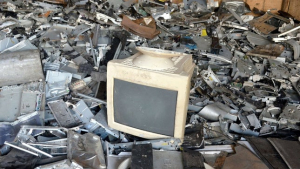 Bankers, reporters, and politicians are all focused on inflation right now.
Bankers, reporters, and politicians are all focused on inflation right now.
Markets know better.
It’s true prices are rising. Wages are rising, too. Working conditions are even improving. I fail to see a problem here.
But just as some prices rise, other prices fall. Lumber prices have already rolled over. As electric cars begin to roll off lots next year, gas prices should ease.
A generation ago, it was hard to counteract rising commodity prices. Macro analysts are still locked into that mindset.
But now there’s software. Software scales. Software fights inflation with productivity. Clouds also fight inflation, helping scientists and engineers create substitutes for resources.
 Is the price for the material in electronic parts causing you trouble? Rice University scientists recently found a way to recover those materials at low cost. Solar panels get more efficient, and cheaper every year. It’s already cheaper to harvest energy with them, or with wind turbines, than to burn what the Saudis pump from the ground. Even the Saudis know that.
Is the price for the material in electronic parts causing you trouble? Rice University scientists recently found a way to recover those materials at low cost. Solar panels get more efficient, and cheaper every year. It’s already cheaper to harvest energy with them, or with wind turbines, than to burn what the Saudis pump from the ground. Even the Saudis know that.
Supply chains can be unsnarled with investment and effort. Most price hikes are transitory, caused by a rush of demand that overwhelms what planners expected. Reporters interested only in scaring people scream about rising milk prices, ignoring the fact that farmers were pouring it into drains early this year.
No one follows up when price rises in a particular sector ease. Markets do. That’s why the value of software stocks and cloud stocks have exploded in 2021. Microsoft is now the world’s most valuable company. Companies like Cloudflare are both protecting online resources and bringing the cloud’s strengths into corporate data centers. Taiwan Semiconductor has cracked the code on Moore’s Law, and Intel will follow it into the Angstrom era, measuring circuit distances by tenths of a nanometer.
Only the market knows what will happen once the current chip shortage eases. They’re betting that productivity will take another jump. They’re right.
The world of 2030 will be quite different from today’s world, perhaps even in the Third World.
Technology can whip inflation now.










